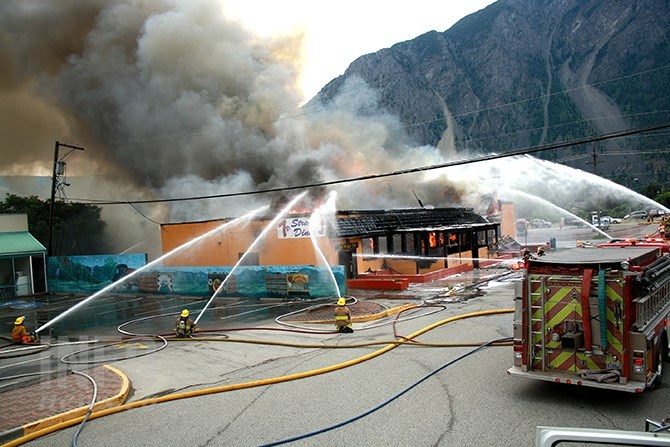
New provincial regulations and insurance underwriters' concerns could affect regional fire departments operationally and financially, Emergency Services Supervisor Dale Kronebusch told regional district board directors recently. Above, Keremeos and District Volunteer firefighters battle the Keremeos Hotel fire last July.
(STEVE ARSTAD / iNFOnews.ca)
May 13, 2015 - 3:06 PM
PENTICTON - New provincial regulations affecting the province's fire departments was a topic of discussion for the Regional District Okanagan Similkameen’s Emergency Services Supervisor at a recent committee meeting.
RDOS supervisor Dale Kronebusch provided directors with a snapshot of changes coming to the region’s fire departments as a result of the recently introduced B.C. Fire Service Minimum Standards Playbook. He also updated them on underwriters’ concerns about firefighting in the regional district.
The playbook, unveiled in October 2014, spells out requirements for three possible levels of service regional fire departments would be required to train to. Kronebusch said it was up to the regional district board to decide what level of service each regional fire department would provide to their respective communities. New service classifications denoted external operation, internal operation and full service operation.
Kronebusch said clarification is needed with respect to regional district departments still running as societies regarding who their 'authority having jurisdiction' would be.
“Is it the regional district, or is it the society, that’s the question. Is it the society president, or is it us?” he asked.
Firefighter training will also depend on the level of service designated for a particular department, Kronebusch noted, adding departments now had no choice in training levels provided. He said the book also defined new positions that will now be standard in regional fire departments and there are also new Worksafe B.C. regulations affecting firefighting operations, including asbestos exposure and bullying.
“The underwriters are saying you need 15 members registered on your roster in order to be a recognized fire service. That’s a difficult task sometimes,” he said, adding declining volunteer numbers are a problem across Canada, not just the regional district.
Kronebusch said he would be looking into the possibility of offering, through joint purchase, medical and dental benefits to volunteer firefighters.
Kronebusch also discussed maximum travel distances for responding fire departments, noting the eight-kilometre limit used by underwriters when assessing fire insurance policies could be reached more quickly by a rural department responding on a highway than a city department responding on city streets. He said time may serve as better criteria for assessing insurance coverage than distance.
He further cautioned directors on the need to make long term budget plans to replace certified equipment, noting many regional district departments have old, perfectly serviceable, low-mileage equipment that would soon not meet the age requirement for certified apparatus.
Kronebusch said the playbook was released following budget finalization for 2015. The regulations need to be analyzed to determine what implications they will have on subsequent budgets.
He said the increasing regulations were resulting in increasing burnout in volunteer service, noting some of the regulations increased workloads disproportionally for certain departments.
There is no formal schedule for the introduction of playbook standards, but Kronebusch said the expectation is to begin implementing the policy immediately.
To contact the reporter for this story, email Steve Arstad at sarstad@infonews.ca or call 250-488-3065. To contact the editor, email mjones@infonews.ca or call 250-718-2724.
News from © iNFOnews, 2015